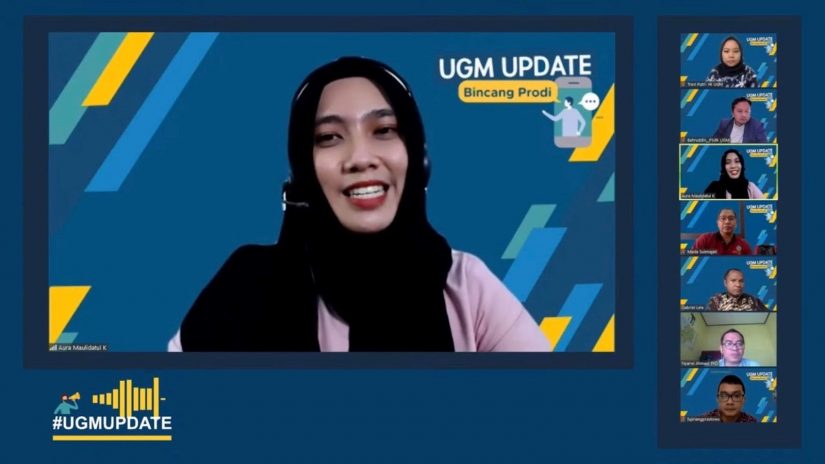
Yogyakarta, January 11th 2022─Universitas Gadjah Mada through its official channel (@ugm.yogyakarta) held a Study Program Talk, in which in this episode 11 discussed about six study programs in the Faculty of Social and Political Sciences. The study program discussion series was conducted through a question and answer session guided by moderator Aura Maulidatul K. and answered by six speakers who were representatives of each study program. Starting from Mada Sukmajati (Head of Undergraduate Program of the Department of Politics and Government), Gabriel Lele (Head of Undergraduate Program of the Department of Public Policy Management), Fuji Riang Prastowo (Secretary of the Department of Sociology), Treviliana Eka Putri (Secretary of Department of International Relations), Bahruddin (Secretary of the Department of Social Development and Welfare), and Nyarwi Ahmad (Head of Department of Communication Studies). “The Department of Politics and Government has a vision of realizing educational institutions as the development of social science and political science that sided with democratic and human values. The curriculum that we offer has studies on politics, government, and general social sciences,” explained Mada Sukmajati, Head of the Undergraduate Study Program at the Department of Politics and Government at the start of the Q&A session of the Study Program Discussion.
“There are three menus that we offer, starting from social policies that discuss the policy development process, community empowerment with capacity and knowledge development in seeing needs and potential, as well as CSR responsibilities. Where this learning is expected to encourage PSdK students to become part of companies that contribute to social responsibility,” said Bahruddin as Secretary of the Department of Social Development and Welfare.
This question and answer session also discussed the development of student abilities facilitated by each study program. Among them, there is development through a curriculum that technically has weight in improving the technical abilities of students, such as from the Department of Politics and Government which offers network management skills, political communication, persuasion skills, and big data processing. In addition, there is International Relations which offers English and public speaking skills which will continue to be honed during lectures. No less than the two, the Department of Public Policy Management also offers a program called Young Professional Development Training which facilitates students to prepare for a career. Other capabilities are also offered by the Social Development and Welfare Study Program by emphasizing analytical crisis skills on problems and potentials of social and welfare issues.
“In the first period, we will introduce the nature of the Communication Studies study program which consists of elements of science and skills. After that, students will be invited to get acquainted with the fields contained in the study program, ranging from journalism, public relations, creative, and film. Outside of the curriculum, we also support student activities who actively create programs in order to improve their abilities,” Nyarwi Ahmad, Head of Communication Studies Study Program, continued.
“Sociology Study Program will provide students’ ability to think more reflectively. We will facilitate knowledge about methodologies, use of quantitative data, and study discourses,” Fuji Riang Prastowo as Secretary of the Department of Sociology said.
Closing the Study Program Discussion session, the six speakers also mentioned the job prospects of each study program, some of which are spread across various sectors, ranging from journalism, government agencies, private and multinational companies, NGOs, to start-ups.
